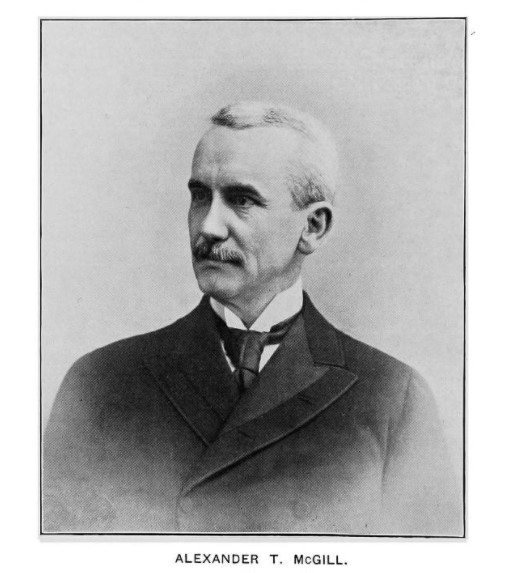Alexander Taggart McGill, A.M., LL.D., for thirteen years Chancellor of the State of New Jersey, was born October 20, 1845, in Allegheny City, Pa., where his father, Rev. Alexander T. McGill, D.D., LL.I)., was a professor in the Western Theological Seminary. His great-grandfather was an Indian fighter of note in Pennsylvania, and served as a Lieutenant-Colonel in the Continental Army under Washington at Trenton and Princeton. The Chancellor’s father was for some years a lawyer in Georgia, but later studied theology and became professor in the Western Theological Seminary. When the Chancellor was nine years old, in 1854, his father accepted a professorship in Princeton Theological Seminary and the family moved to New Jersey. His father held that position until his death in 1889.
Chancellor McGill thus spent his early life in the midst of the best educational and social advantages, which he imbibed with an eagerness characteristic of his race. While a youth he exhibited scholarly tastes, and rapidly acquired a high standing as a thorough and painstaking student. His chief aim was to master every problem, no matter how difficult, that came to his attention. He was a keen observer, possessed of analytical powers of a high order, and won the praise and respect of both teachers and associates. Entering Princeton College, he pursued the regular course and received the degree of A.B. in 1864 and that of A.M. in 1867, and afterward his alma mater and Rutgers College of New Jersey each conferred upon him the honorary degree of LL.D. In June, 1866, he was graduated from the Columbia Law School, and thereafter continued his legal studies with the late Hon. Edward W. Scudder, of Trenton. He came to the bar in New Jersey as an attorney at the November term, 1867, and as a counselor in November, 1870.
For a few months he remained in Trenton as an associate of his preceptor, Judge Scudder, and then, in 1868, moved to Jersey City, where he afterward resided. Chancellor McGill soon achieved prominence as an able, industrious, and conscientious lawyer. From 1870 to 1876 he was the law partner of the late Attorney General Robert Gilchrist. In 1874 and 1875 he was counsel for the City of Bayonne and also member of Assembly from the then First District of Hudson County. He was active and influential in the Legislature, and served on the leading committees. In April, 1878, Governor McClellan appointed him Prosecutor of the Pleas for the County of Hudson, and in April, 1883, he was appointed Law Judge of that county by Governor Ludlow.
On March 29. 1887, he was appointed by Governor Green as Chancellor of the State of New Jersey, and the appointment was unanimously confirmed by the Senate on the 31st of the same month. His first term expired May 1, 1894, and he was re-appointed to the office by Governor Werts, and at once unanimously confirmed by the Senate without reference.
It was during his term as Chancellor that the famous coal combine bill was passed by the Legislature. When Governor Abbett refused to sign the bill the railroad companies in the combination contended that they were protected by existing laws, and proceeded to act accordingly. The attorney general brought suit against the Coal Trust in the Court of Chancery. The Chancellor rendered a decision which not only laid down the relations of corporations to the State with a clearness and fairness that placed his ruling beyond attack, but dealt a blow to all the monopoly combinations of the Coal Trust class.
In the fall of 1895 the Democratic party nominated the Chancellor for Governor. In the campaign that followed he took no part, but continued to discharge the duties of the office of Chancellor. The election resulted in his defeat by John W. Griggs, now United States Attorney General, by a plurality of 26,900.
Chancellor McGill died April 21, 1900, at his home in Jersey City. His friends declare that he died a martyr to duty. His office killed him. He was a scrupulously conscientious man, and thought of duty above everything else. He would never shirk a responsibility, however much he might suffer in fulfilling it. His learning, dignity, good judgment, and ability long adorned the highest equity bench in the State. He was one of the most popular jurists that ever presided over the Courts of Errors and Appeals and Chancery. As a citizen, lawyer, and judge he was universally respected and esteemed.
Chancellor McGill married Miss Olmstead, a relative of the Stevens family, of Hoboken, who survives. He had no children. He is also survived by a brother, Dr. John D. McGill, Surgeon-General of New Jersey.
Source: Harvey, Cornelius Burnham, Editor; Genealogical History of Hudson and Bergen Counties, New Jersey, New York: The New Jersey Genealogical Publishing Company, 1900.

